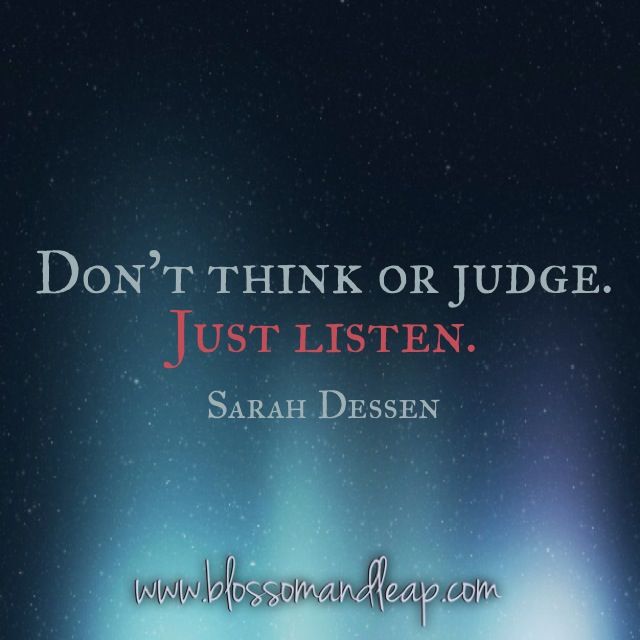We Listen And We Don't Judge: Things To Say That Matter
Ever felt like the world’s got too much noise and not enough listening? Well, buckle up, because today we're diving deep into the art of communication where "we listen and we don't judge." This phrase might sound simple, but trust me, it’s a game-changer in how we connect with others. Imagine being in a room where everyone is heard without fear of criticism or misunderstanding. Sounds pretty rad, right?
Communication is more than just talking. It's about creating a space where people feel safe enough to share their thoughts, dreams, and fears. And let's face it, in a world filled with opinions and judgments, finding someone who truly listens can feel like finding a unicorn. But here’s the thing: it’s totally possible, and we’re about to break it down step by step.
So, if you're ready to level up your communication game, stick around. We're going to explore the power of listening without judgment, the things you can say to make someone feel truly heard, and how this approach can transform your relationships. Let's dive in!
Read also:Bear Pause Hackensack Mn Your Ultimate Guide To This Hidden Gem
Why Listening Without Judgment Matters
Let’s get real for a second. How often do we find ourselves waiting for our turn to speak instead of actually listening? Probably more than we’d like to admit. When we say "we listen and we don't judge," we're talking about a mindset shift. It's about being fully present for someone, without letting our biases or opinions cloud the moment.
Studies show that active listening improves trust and strengthens relationships. According to a report by the American Psychological Association, when people feel heard, they're more likely to open up and share their authentic selves. And let's be honest, who doesn’t want deeper, more meaningful connections?
Think about it: how many times have you left a conversation feeling like the other person just didn’t get you? That’s because true listening goes beyond hearing words. It’s about understanding the emotions behind them. So, let’s explore how we can become better listeners and what to say to make someone feel valued.
Things to Say When You’re Listening Without Judgment
Now that we’ve established why listening matters, let’s talk about what to say. Because, let’s be real, sometimes it’s hard to know where to start. Here’s a list of phrases that can help you create a judgment-free zone:
- "Tell me more about that."
- "I’m here for you, no matter what."
- "I can only imagine how that must feel."
- "Thank you for sharing this with me."
- "I’m listening, and I won’t judge you."
- "How can I support you right now?"
These simple phrases can make a world of difference. They show that you’re engaged, empathetic, and committed to understanding the other person’s perspective. And hey, sometimes all someone needs is a safe space to express themselves.
Creating a Safe Space for Honest Conversations
When we say "we listen and we don't judge," we’re talking about creating an environment where people feel safe to be vulnerable. This doesn’t happen overnight, but there are steps you can take to make it happen:
Read also:Asriah Summer 2024 The Ultimate Guide To The Trendsetting Fashion Sensation
1. Show Up With an Open Mind
Approach every conversation with curiosity, not criticism. Remember, everyone has a story, and it’s not your job to fix it or offer advice unless asked. Just be there.
2. Practice Empathy
Put yourself in the other person’s shoes. If they’re sharing something difficult, acknowledge their feelings. A simple “That sounds really tough” can go a long way.
3. Avoid Interrupting
Let them finish their thoughts before jumping in. Interrupting can make someone feel like their voice doesn’t matter, which is the opposite of what we’re aiming for.
By creating a safe space, you’re encouraging open and honest communication. And let’s be honest, that’s where the magic happens.
How to Respond Without Judging
Responding without judgment is an art that takes practice. Here’s how you can do it:
- Reflect back what you’ve heard. For example, “It sounds like you’re feeling overwhelmed.”
- Avoid saying things like “You shouldn’t feel that way” or “That’s not a big deal.” Everyone’s feelings are valid.
- Ask clarifying questions if you’re unsure. “Can you tell me more about how that made you feel?”
- Offer support instead of solutions. “How can I help you right now?”
Remember, the goal isn’t to solve their problems (unless they ask for it). It’s to make them feel heard and understood. And honestly, that’s often the best gift you can give someone.
The Power of Non-Verbal Communication
Let’s not forget about body language. Sometimes, what we don’t say speaks louder than words. Here’s how to use non-verbal cues to show you’re listening:
- Maintain eye contact (but don’t stalk them).
- Nod occasionally to show you’re following along.
- Lean in slightly to show engagement.
- Avoid distractions like checking your phone or looking around the room.
Non-verbal communication reinforces the message that you’re fully present. And hey, who doesn’t love a little extra attention, right?
Common Barriers to Listening Without Judgment
Of course, it’s not always easy to listen without judging. Here are some common barriers and how to overcome them:
1. Bias
We all have biases, but they can get in the way of truly understanding someone. Try to recognize your own biases and set them aside when listening.
2. Impatience
Let’s face it, life’s busy. But if you’re rushing through a conversation, you’re missing the point. Take a deep breath and give the person your full attention.
3. Need to Fix
Some of us have a natural urge to offer solutions, but sometimes all someone needs is a listening ear. Resist the urge to fix and just be there.
By overcoming these barriers, you’ll become a more effective listener and create deeper connections with others.
The Benefits of Listening Without Judgment
So, why should you bother with all this listening stuff? Here are just a few benefits:
- Stronger, more meaningful relationships.
- Increased trust and respect.
- Improved communication skills.
- Deeper understanding of others.
And let’s not forget, when you listen without judgment, you’re also giving yourself permission to be heard without fear. It’s a win-win situation.
Practical Tips for Everyday Listening
Ready to put this into practice? Here are some tips for incorporating "we listen and we don't judge" into your everyday life:
1. Start Small
Practice listening without judgment in low-stakes situations, like chatting with a friend or colleague. As you get more comfortable, you can apply it to more challenging conversations.
2. Set Boundaries
Listening doesn’t mean you have to take on someone else’s problems. Set healthy boundaries and communicate them clearly.
3. Be Patient
Change takes time. Don’t get discouraged if you slip up. Just keep practicing, and you’ll get better at it.
With these tips, you’ll be well on your way to becoming a master listener. And trust me, your relationships will thank you for it.
Real-Life Examples of Listening Without Judgment
Let’s look at some real-life examples of how listening without judgment can make a difference:
Example 1: A Friend Struggling with Anxiety
Your friend opens up about their anxiety. Instead of offering unsolicited advice, you say, “That sounds really tough. I’m here for you, and I won’t judge you.” This simple response can make them feel supported and understood.
Example 2: A Colleague Facing a Work Challenge
Your colleague is struggling with a project. Instead of jumping in with solutions, you ask, “How can I support you right now?” This shows that you’re there to help, not to fix.
These examples illustrate how listening without judgment can transform everyday interactions. And honestly, isn’t that what life’s all about?
Conclusion: Level Up Your Communication Game
So, there you have it. The power of "we listen and we don't judge" is real, and it can change the way you connect with others. By creating a safe space for honest conversations, responding without judgment, and using both verbal and non-verbal cues, you can build stronger, more meaningful relationships.
But here’s the kicker: it’s not just about the other person. When you listen without judgment, you’re also giving yourself permission to be heard and understood. And that’s a beautiful thing.
So, what’s next? Start practicing these skills in your everyday life. Share this article with someone who could benefit from it. And most importantly, keep showing up as the best listener you can be. Because in a world that’s often too loud, being heard is a gift worth giving.
Table of Contents
- Why Listening Without Judgment Matters
- Things to Say When You’re Listening Without Judgment
- Creating a Safe Space for Honest Conversations
- How to Respond Without Judging
- The Power of Non-Verbal Communication
- Common Barriers to Listening Without Judgment
- The Benefits of Listening Without Judgment
- Practical Tips for Everyday Listening
- Real-Life Examples of Listening Without Judgment
- Conclusion: Level Up Your Communication Game
Remember, the journey to becoming a better listener starts with one conversation. So, go out there and make it count!


